If This Goes On Read online
Edited by Cat Rambo
www.ParvusPress.com
Parvus Press, LLC
PO Box 224
Yardley, PA 19067-8224
ParvusPress.com
If This Goes On
Copyright 2019 by Parvus Press
All stories contained herein are copyright 2019 by their respective authors.
All rights reserved.
No part of this publication may be reproduced, stored in a retrieval system, or transmitted, in any form or by any means, electronic, mechanical, magical, photocopying, or otherwise, without the prior written permission of the copyright holder.
Parvus Press supports our authors and encourages creatives of all stripes. If you have questions about fair use, duplication, or how to obtain donated copies of Parvus books, please visit our website.
Thank you for purchasing this title and supporting the numerous people who worked to bring it together for your enjoyment.
Strange women lying in ponds distributing swords is starting to seem like it might be a reasonable basis for a system of government.
Special thanks to our Kickstarter supporters for helping bring this project to light.
Trade Paperback ISBN 13 978-0-9997842-1-1
Ebook ISBN 978-0-9997842-0-4
Cover art by Bernard Lee
Cover design by Michael Altman
Print design and typeset by Catspaw DTP Services
Digital Design by Parvus Press
Table of Contents
Preface
Green Glass: A Love Story by E. Lily Yu
Twelve Histories Scrawled in the Sky by Aimee Ogden
Dead Wings by Rachel Chimits
Welcome to Gray by Cyd Athens
The Stranded Time Traveler Embraces the Inevitable by Scott Edelman
Good Pupils by Jack Lothian
All the Good Dogs Have Been Eaten by Gregory Jeffers
The Sinking Tide by Conor Powers-Smith
Mustard Seeds and the Elephant’s Foot by Priya Sridhar
Mr. Percy’s Shortcut by Andy Duncan
A Gardener’s Guide to the Apocalypse by Lynette Mejía
But for Grace by Hal Y. Zhang
Hurrah! Another Year, Surely This One Will Be Better Than The Last; The Inexorable March of Progress Will Lead Us All to Happiness by Nick Mamatas
The Last Adventure of Jack Laff: The Dayveil Gambit by Steven Barnes
Three Data Units by Kitty-Lydia Dye
One Shot by Tiffany E. Wilson
King Harvest (Will Surely Come) by Nisi Shawl
Counting the Days by Kathy Schilbach
Making Happy by Zandra Renwick
The Machine by Chris Kluwe
That Our Flag Was Still There by Sarah Pinsker
The Editor’s Eyes by Calie Voorhis
Free WiFi by Marie Vibbert
Discobolos by James Wood
Fine by Jamie Lackey
Bulletproof Tattoos by Paul Crenshaw
Call and Answer by Langley Hyde
A Pocketful of Dolphins by Judy Helfrich
Tasting Bleach and Decay in the City of Dust by Beth Dawkins
The Choices You Make by Sylvia Spruck Wrigley
A Word From Parvus Press
Acknowledgements
Preface
When I first wrote up the call for submissions for If This Goes On, I said:
This project is born of rage and sorrow and hope. Rage at the way America has been stolen and how those thieves have been eating away at its infrastructure. Sorrow at the lives being destroyed in the sorrow as well as for the earth as its protections are stripped away by a kleptocratic and corrupt regime. Sorrow for the way words themselves have been distorted and twisted away from truth.
And hope. Because humans continue to progress and evolve, even though that climb is a rocky one and we slide back sometimes. We seem to have done so recently. And so this anthology, an attempt to rally, to inspire, and to awaken. Some stories will despair, but others will have the light we seek, lamps to light the path and show the pitfalls as we continue upwards.
This anthology is part of my resistance. I hope it will be part of yours as well.
In the months since I wrote that, things have only gotten worse, and I can predict that they’ll get even worse before they get better. But I was deeply moved by the hope and willingness to speak out evidenced in so many of these stories. By the humor, empathy, and sheer ability to spin language into a meaningful story of the sort that teaches those first two qualities.
But these stories—this anthology—have failed if they do not move you to action. It is no longer sufficient to only act with words or emoticons, button clicks indicating a like, or sharing a post. This November, it wasn’t enough simply to vote. Like countless other women across this country, I was moved to action by helping register people to vote and driving them to the polls, even in blue Washington state. Because we must stand up and be counted, adding our voices to the mass speaking out to say it’s wrong to have a government driven by kleptocrats, using hatred and propaganda to keep themselves in power.
We flipped the house this fall, but it’s not time to rest. It’s time to push forward and to continue to act. To fight against the futures this collection warns us we are headed toward.
If you’re not an American citizen or otherwise unable to vote, do what you can to magnify the message. Volunteer. Donate. Support. And join us in living every day as though it is the future we want, one where people’s rights are respected, where diversity is not just acknowledged but valued for the strengths it brings with it. A world where integrity and honesty matter, rather than a world of facades and deceptions created by a shallow willingness to repeat lies over and over again.
We have created some of the lamps I spoke of in the call, and I’ve assembled some of the ones that shine the brightest. Reach out your hand to pick one up and come with us into worlds very like this one—but just a little different.
Yours in solidarity,
Cat Rambo
Green Glass: A Love Story
E. Lily Yu
The silver necklace that Richard Hart Laverton III presented to Clarissa Odessa Bell on the occasion of her thirtieth birthday, four months after their engagement and six months before their wedding date, was strung with an irregular green glass bead that he had sent for all the way from the lunar surface. A robot had shot to the moon in a rocket, sifted the dust for a handful of green glass spheres, then fired the capsule to Earth in a much smaller rocket. The glass melted and ran in the heat of re-entry, becoming a single thumb-sized drop before its capsule was retrieved from the South China Sea. The sifter itself remained on the moon, as a symbol, Clarissa thought, of their eternal union.
For her thirtieth birthday, they ate lab-raised shrimp and two halves of a peach that had somehow ripened without beetle or worm, bought that morning at auction, the maître d’ informed them, for a staggering sum. Once the last scrap of peach skin had vanished down Clarissa’s throat, Richard produced the necklace in its velvet box. He fumbled with the catch as she cooed and cried, stroking the green glass. The waiters, a warm, murmuring mass of gray, applauded softly and admiringly.
Clarissa and Richard had known each other since the respective ages of six and five, when Clarissa had poured her orange juice down the fresh white front of Richard’s shirt. This had been two decades before the citrus blight that spoiled groves from SoCal to Florida, Clarissa always added when she told this story, before eyebrows slammed down like guillotines.
They had attended elementary, middle, a
nd high school together, hanging out in VR worlds after school. Clarissa rode dragons, and Richard fought them, or sometimes it was the other way round, and this taught them grammar and geometry. Sometimes Clarissa designed scenarios for herself in which she saved islands from flooding or villages from disease. She played these alone, while Richard shot aliens.
These intersections were hardly coincidental. In all of Manhattan there were only three elementary schools, four middle schools, and two high schools that anybody who was anybody would consider for their children.
College was where their paths diverged: Richard to a school in Boston, Clarissa to Princeton, with its rows and ranks of men in blistering orange. She sampled the courses, tried the men, and found all of it uninspiring.
The working boys she dated, who earned sandwich money in libraries and dining halls, exuded fear from every pore. There was no room for her on the hard road beside them, Clarissa could tell; they were destined for struggle, and perhaps someday, greatness. The children of lawyers, engineers, and surgeons opened any conversation with comments on estate planning and prenups, the number of children they wanted, and the qualities of their ideal wives, which Clarissa found embarrassingly gauche. And those scions of real power and money danced, drank, and pilled away the hours: good fun for a night but soon tedious.
Several years after her graduation, her path crossed with Richard’s. Clarissa was making a name for herself as a lucky or savvy art investor, depending on whom you asked, with a specialty in buying, restoring, and selling deaccessioned and damaged art from storm-battered museums. She had been invited to a reception at a rooftop sculpture garden in lower Manhattan, where folk art from Kentucky was on display. Absorbed in the purple and orange spots of a painted pine leopard, she did not notice the man at her elbow until he coughed politely and familiarly. Then she saw him, truly saw him, and the art lost its allure.
Holding their thin-stemmed wine glasses, they gazed down from the parapets at the gray slosh of water below. It was high tide, and the sea lapped the windows of pitch-coated taxis. Clarissa speculated on whether the flooded-out lower classes would switch entirely to paddleboats, lending New York City a Venetian air, and whether the rats in subways and ground-floor apartments had drowned in vast numbers or moved upwards in life. Richard suggested that they had instead learned to wear suits and to work in analysis in the finance sector. Then, delicately, with careful selections and excisions, they discussed the previous ten years of their lives.
As servers in sagging uniforms slithered like eels throughout the crowd, distributing martinis and glasses of scotch, Clarissa and Richard discovered, with the faint ring of fatedness, that both were single, financially secure, possessed of life insurance, unopposed to prenuptial agreements, anxious to have one boy and one girl, and crackling with attraction toward each other.
“I know it’s unethical to have children,” Clarissa said, twisting her fingers around her glass. “With the planet in the shape it’s in—”
“You deserve them,” Richard said. “We deserve them. It’ll all be offset, one way or another. The proposed carbon tax—”
His eyes were a clear, unpolluted blue. Clarissa fell into them, down and down.
There was nothing for it but to take a private shell together. Giggling and shushing each other like teenagers—since Clarissa, after all, was supposed to be assessing the art, and Richard evaluating a candidate for his father’s new venture—they slipped toward the stairs.
“Hush,” Clarissa said, as the bite of cigarette smoke reached her. Two servers were sneaking a break of their own, up on top of the fragile rooftop bar.
“Poison tide today,” one said, “up from the canal. Don’t know how I’ll get home now.”
“Book a cargo drone.”
“That’s half our pay!”
“Then swim.”
“Are you swimming?”
“I’m sleeping here. There’s a janitorial closet on—well, I’m not telling you which floor.”
Clarissa eased the stairwell door shut behind her.
As they descended to the hundredth level, where programmable plexiglass bubbles waited on their steel cables, Clarissa and Richard quietly congratulated each other on their expensive but toxin-free method of transport.
The lights of the city glimmered around them as their clear shell slid through the electric night. One block from Richard’s building, just as Clarissa was beginning to distinguish the sphinxes and lions on its marble exterior, he covered her small, soft hand with his.
Before long, they were dancing the usual dance: flights to Ibiza, Lima, São Paulo; volunteer trips to the famine-wracked heartlands of wherever; luncheons at Baccarat and dinners at Queen Alice; afternoons at the rum-smelling, dusty clubs that survived behind stone emblems and leaded windows. And one day, at a rooftop dessert bar overlooking the rooftop garden where the two of them had rediscovered each other, Richard presented Clarissa with the diamond ring that his great-grandmother, then grandmother, then aunt had worn.
“It’s beautiful,” she breathed. All the servers around them smiled gapped or toothless smiles. Other patrons clapped. How her happiness redounded, like light from the facets of a chandelier, giving others a taste of happiness as well!
“Three generations of love and hard work,” Richard said, sliding the diamond over her knuckles. “Each one giving the best opportunities to their children. We’ll do that too. For Charles. For Chelsea.”
Dimly Clarissa wondered when, exactly, they had discussed their future children’s names; but there was nothing wrong with Charles or Chelsea, which were perfectly respectable appellations, and now Richard’s fingers were creeping under the silk crepe of her skirt, up the inside of her stockinged thigh, and she couldn’t think.
A week later all three pairs of parents held a war council, divided the wedding between them, and attacked their assignments with martial and marital efficiency. Clarissa submitted to a storm of taffeta and chiffon, peonies and napkins, rosewater and calligraphy. She was pinched and prodded and finally delivered to a French atelier, the kind that retains, no matter the hour, an unadulterated gloom that signifies artistry. Four glasses of champagne emerged, fuming like potions. A witchlike woman fitted Clarissa for the dress, muttering in Czech around a mouthful of pins.
Then, of course, came the rocket, robot, and drone, and Richard’s green glass bead on its silver chain.
And everything was perfect, except for one thing.
A taste—a smell—a texture shimmered in Clarissa’s memory of childhood, cool and luminous and lunar beside the sunshine of orange juice.
“Ice cream,” Clarissa said. “We’ll serve vanilla ice cream in the shape of the moon.”
This was the first time Clarissa had spoken up, and her Mim, in whose queendom the wedding menu lay, caught her breath, while Kel, her father’s third wife, and Suzette, Richard’s mother, arched one elegant, symmetrical eyebrow apiece.
“I don’t really know—” her Mim began to say.
Clarissa said, “It’s as close as anyone can get to the moon without actually traveling there. And the dress is moon white. Not eggshell. Not ivory. Not seashell or bone.”
Kel said, “I think the decorations will be enough. We have the starfield projector, the hand-blown Earth, the powder floor—”
“Little hanging moons of white roses,” Suzette added. “Plus a replica of Richard’s robot on every table. Isn’t that enough?”
“We’re having ice cream,” Clarissa said. “The real thing, too. Not those soy sorbets that don’t melt or coconut-sulfite substitutes. Ice cream.”
“Don’t you think that’s a bit much?” her Mim said. “You are successful, and we are very fortunate, but it’s generally unwise to put that on display.”
“I disagree with your mother in almost everything,” Kel said, “but in this matter, she’s right. Where in the world would we find
clean milk? And uncontaminated eggs? As for vanillin, that’s in all the drugstores, but it’s a plebian flavor, isn’t it?”
“Our people don’t have the microbiomes to survive a street egg,” Suzette said. “And milk means cancer in ten years. What will you want next? Hamburgers?”
“I’ll find what I need,” Clarissa said, fingering her necklace. The moon glass was warm against her skin. Richard could surely, like a magician, produce good eggs from his handkerchief.
Synthetic vanillin was indeed bourgeois and therefore out of the question. Clarissa took three shells and a boat, rowed by a black man spitting blood and shrinking into himself, to the Museum of Flavors. This was a nondescript office building in the Bronx, whose second-floor window had been propped open for her.
Whatever government agency originally funded it had long since been plundered and disbanded. Entire crop species, classes of game birds, and spices now existed only in these priceless, neglected vaults. The curator was only too happy to accept a cash transfer for six of the vanilla beans, which he fished out of a frozen drawer and snipped of their tags. He was an old classmate from Princeton, who lived in terror that the contents of his vaults might be made known, attracting armed hordes of the desperate and cruel. But Clarissa, as he knew well, was discreet.
The amount exchanged approached the value of one of her spare Rothkos. Clarissa made a mental note to send one to auction.
Richard, dear darling Richard, had grumblingly procured six dozen eggs by helicopter from Semi-Free Pennsylvania by the time she returned. He had been obliged to shout through a megaphone first, while the helicopter hovered at a safe distance, he said, before the farmer in question set his shotgun down.
“As for the milk,” he said, “You’re on your own. Try Kenya?”
“If the bacteria in a New York egg would kill Mim,” Clarissa said, “milk from a Kenyan cow—”
“You’re right. You’re sure a dairy substitute—”

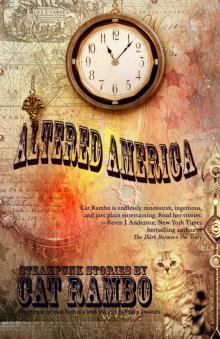 Altered America
Altered America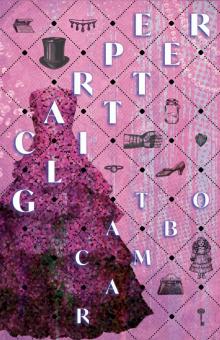 Carpe Glitter
Carpe Glitter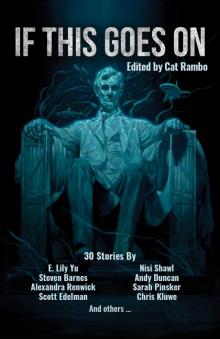 If This Goes On
If This Goes On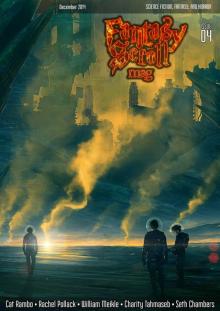 Fantasy Scroll Magazine Issue #4
Fantasy Scroll Magazine Issue #4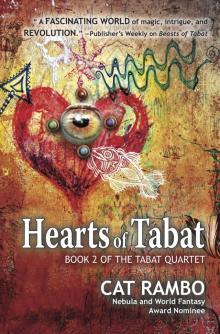 Hearts of Tabat
Hearts of Tabat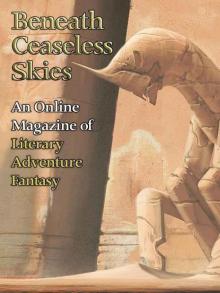 Beneath Ceaseless Skies #151
Beneath Ceaseless Skies #151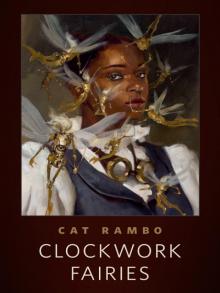 Clockwork Fairies
Clockwork Fairies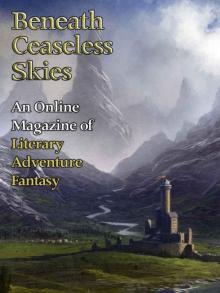 Beneath Ceaseless Skies #170
Beneath Ceaseless Skies #170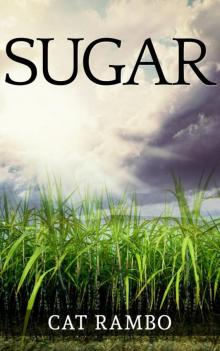 Sugar
Sugar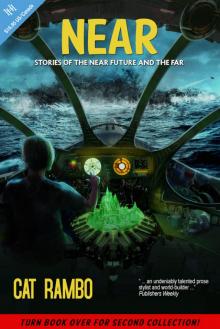 Near + Far
Near + Far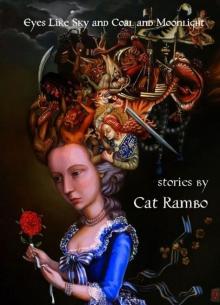 Eyes Like Sky And Coal And Moonlight
Eyes Like Sky And Coal And Moonlight